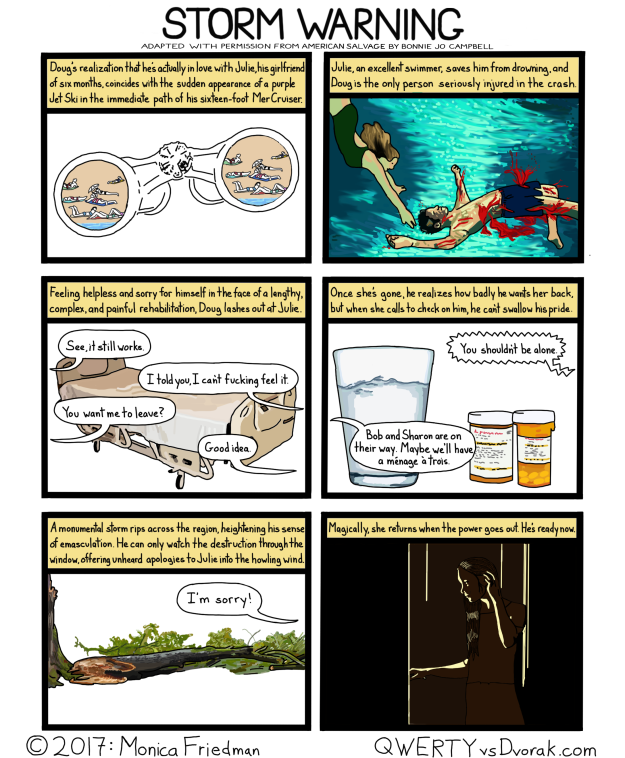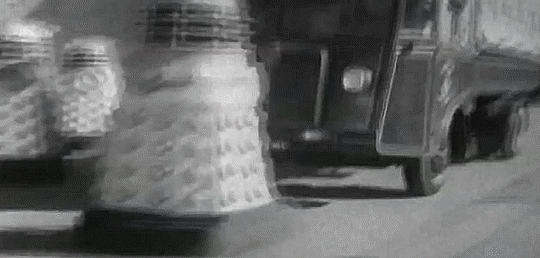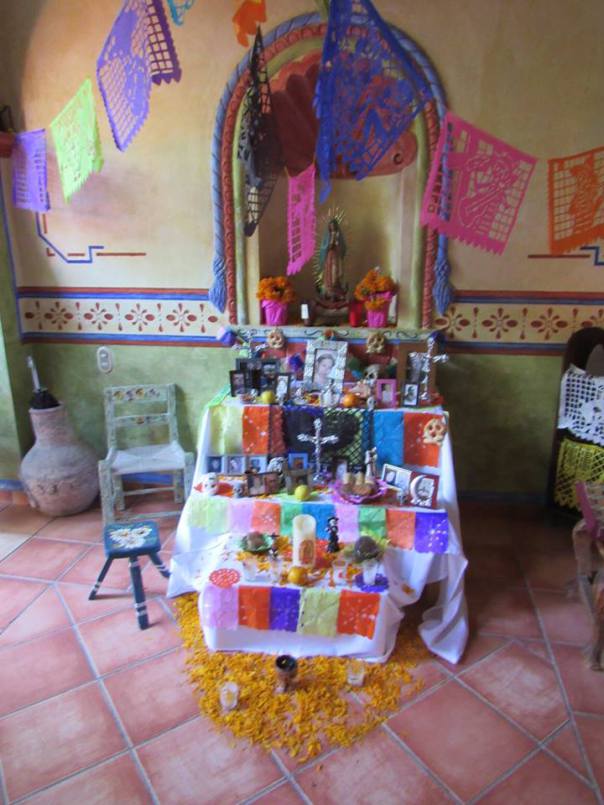 El Dia de Los Muertos: photo by Steve Smith
El Dia de Los Muertos: photo by Steve Smith
“In the casa where I am currently staying in Jalpan, Mexico, an altar is set up prominently to honor the ones that are loved but seen no longer. Their photos, together with food offerings for their journeys, a shrine to the Virgin Mary, and other mementos are displayed as a living tribute to the dead. It is this way in every casa in this puebla, and throughout Mexico. This tradition fuses the Christian doctrine of the communion of saints with the more ancient beliefs of the distant past. The dead live among us, and together, we and they pass through this temporal life joined together. Across the great divide that separates mortality and the life beyond, an unbroken chain of love binds one and all.” ~Steve SmithLet me introduce to you my friend Steve Smith. Steve and I met at Holy Hill Hermitage in Skreen, County Sligo, Ireland when we were both on retreat there. Steve and his wife were there for two months. I was there for nine. You can read all about my adventures in Ireland, if you haven’t already, right here, under the Jubilee tab. Steve was working on his novel called, The Twin, which is historical fiction about Jesus and his brother Thomas, who Steve has conjured and who is very much real. Steve’s story is an accurate historical portrayal of life in Israel/Palestine around the years when Jesus walked the earth.
His story is about the entire family and their hard lives as Jews under the oppressors of the Roman Empire. All the characters that folks know from their bibles are here, but they are having lives, just like we do, and those lives are colored by terrible horror, acts of barbarity, beauty and complexity. Steve consulted with me, which was a happy circumstance for us both, about all things Jewish. Steve is a retired priest, he knows his stuff Christian and Jewish, Buddhist and Hindu. Nevertheless, he isn’t Jewish. Part of his story is about the Divine Feminine and both of his Marys, the mother of Jesus, and Mary Magdalene are women of power and are channels for the Shechinah.
Steve is already in touch with the Shechinah. Shechinah gets mistranslated and mispronounced all the time. Trying to name the Divine, is just not really possible. All we can do is list the attributes, describe the qualities. Shechinah is not the name of the female part of the Divine. Shechinah is much, much more than that and not containable within any boundaries. She is called the “In-Dwelling Presence” most often. In the Hebrew, when there is a reference to the cloud that protected the Jewish people as they journeyed in the desert for forty years, that cloud is referenced as the Shechinah’s Presence. She is the protector and the lover and the gentle, tender, green-earth growing mothering aspects of the Divine. Whenever the Divine is being referenced as merciful, the word used comes from the root for the word womb/rechem. This word becomes the word Rachamim.
A more accurate translation for this Hebrew to English would be Womb-Like One. Imagine if when you read the bible, instead of “Merciful God” which is how it gets translated, it actually said “Womb-Like One.” I always try to get folks to understand this basic concept. There is no word for god in the Torah (see Why Ha-Shem Not Naming the Divine). There are only attributes of Holiness that are used interchangeably based on what is going on and what is needed. When those qualities are feminine, which many of them are, female gendered language is used, verb tenses etc… When those attributes are masculine, male gendered language is used. Obviously, the Divine does not have a gender, nor are the words masculine and feminine very useful to try and understand the fluidity of gender that exists in the actual Torah when read in the original Hebrew.
 The offerings of the Shechinah Mama as she is clearly visible in this photo taken by Steve Smith
The offerings of the Shechinah Mama as she is clearly visible in this photo taken by Steve Smith
Access and understanding of the sacred texts in their original language is crucial, but it is something few of us can do. Since having feminine references to GOD THE FATHER was not okay, back in the day, when all of this was translated to Latin, Greek, German and eventually English, we have the mess we have now.The Divine is all and more. The Shechinah is part of that all and more. My connection with Steve happened in Ireland, where we studied her works and who she might have been in the lives of the Virgin Mary and Mary Magdalene. I invite you to read his book, if you are interested in a great story that many folks think they know, but the way Steve tells it, is something all together more. The link for his book will be at the end of this post. With no further ado, I am greatly honored to include this Dia de Los Muertos travel-narrative story by my friend Steve. Unlike his book, this post is not about Jesus as a child, but about being saved when you are lost and alone and finding that you are indeed held in a womb-like way, even when you think you are alone.
In gratitude for all the ways Holiness unfolds in folks and in the world, 
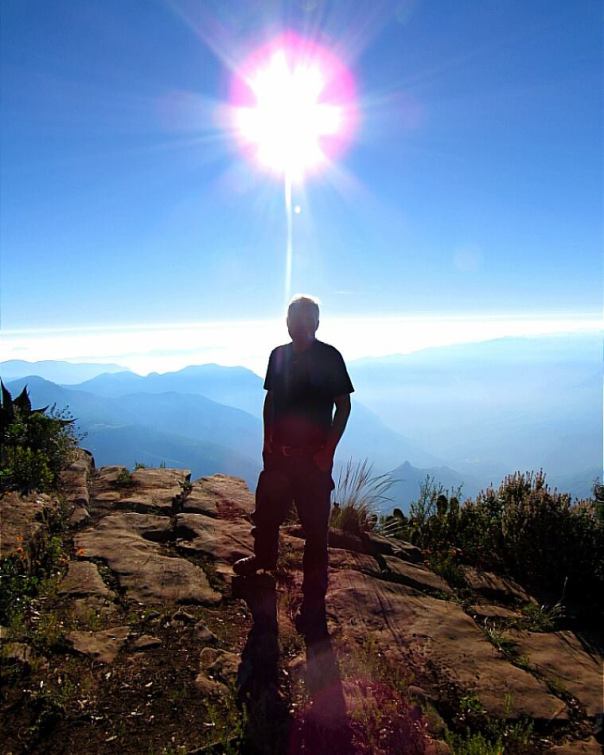 Steve Smith at Sierra Gorda
Steve Smith at Sierra Gorda
Dear Family and Friends,
After settling in to our new life in Mid-Coast Maine, Jeannette and I have just embarked on another ex-pat adventure. Jeannette is in Barcelona, Spain, where she has been invited to team teach an extended workshop in Internal Family Systems to a mostly Spanish-speaking audience. She will be participating in this workshop in November, January, and March.
This week, I left for Mexico, and am staying first in a small mountain town, Jalpan de Serra in the Sierra Gorda, in an exquisite ecological zone five hours north of Mexico City. Jeannette will be joining me for a seven week stay in San Miguel de Allende, followed by a week in the Yucatan, before she heads back to Spain. I will be travelling to Peru in January, where good friend, Michael Corrigan will join me to experience Cuzco, Macchu Pichu, and Lima. Then I will meet up with Martin in Chile, and travel to Patagonia for some trekking, before visiting Argentina. While we are away, Colleen and Luke are taking up residence at our house-sit Seacroft, our wonderful home, by the Penobscot Bay.
It was a crash landing arriving in Mexico a couple of nights ago. I picked up my rental car in Mexico City, and, foolhardily perhaps, tried to rely on my long since atrophied cab driver skills to negotiate my way out of one of the largest cities on the planet. That painfully accomplished, I started out my journey to Jalpan, which Google Maps had identified and directed me to north and east of Mexico City. Even then, I managed to fritter away my time getting lost, and as darkness set in, I found myself on deeply pothole pocked roads, doing untold damage to my front tires and rims. Finally, my left right front tire blew, and I coaxed the car into a Pemex station, and got out the spare, which, predictably, was bald. Into the night, I pressed on, now sleep deprived and disoriented heading up into the switchbacks of the montañas. Suddenly, my right tire blew, and I had no breakdown lane or place to park the car. For at least a few miles, I drove the car on its rim, hoping against hope for somewhere to pull out. Finally, a small opening appeared in the darkness, but still, I was not out of harm’s way. Ongoing trucks bore down on me, blaring horns and high beams alight.
For a moment, I had a strong premonition, with no dramatic exaggeration intended, of my death, brought on, no doubt, by an overwhelming sense that I was completely lost and vulnerable, that brought on, no doubt, by my complete stupidity and arrogance in assuming I could bivouac my way through this uncharted territory.
Despair is a funny thing. It eviscerates, but it also provides for some detachment. I raised the hood, put on the hazard blinkers, opened the trunk, and stood in the darkness, facing the oncoming lights and blare of horns. In that timeless place, I thought it would be hours, if at all, before rescue would come. And at that very moment, a truck approached and turned on its blinking lights. My loved ones must have been praying at that moment. I sure was. It was a wrecker.
Out appeared a young man, Mitch he introduced himself, and we began the task of communicating what had happened to my rental. My Spanish is rusty in my good moments, but without sleep and stressed, it’s a jumbled mess. After several fits and starts, and appeals to my Google map, and showing him by the light of his cellphone the damage I had done to both rims, he cheerily urged me into the cab, while he waved off traffic, and hoisted the car on to truck’s bed. Ten miles further, he brought me to his hometown, Huauchinago, and pulled into his workplace, where his compañeros, taking good-hearted delight in this gringo’s predicament, set to pounding out the sorry tire rims with mallets. Everyone has damaged rims in Mexico, they said. One pantomimed a giant boom to show how the cars fell into the ubiquitous potholes.
Then, my host in Jalpan, who I had texted earlier on Mitch’s cellphone in the car, rang. I explained how close I was, and I was on my way, after I weathered this interruption. “Huauchinago”?, he asked, “I don’t know this town.” It seems, with help from Google, I had found another Jalpan in the opposite direction, and was now eight hours off course. Now, hearing Mitch explain things, the compañeros were doubled over. Then, Mitch set to getting this pilgrim to a hotel in town, while they set out to repairing my car. The night was ablaze with the fireworks of the great feria, La Dia de Los Muertos. When we arrived in town, skeletal apparitions appeared, all reveling in this festival, where the dead come out to party with the living. Reflexively, I joined in the dance.
Next morning, Mitch brought me back to the car, and demonstratively showed me how bad all the tires of the car the rental agency had given me, so we set out to a roadside tire shop. There, two cousins, named in Spanish “The Mosquito Bros”, changed out all my tires on my repaired to normal rims, and found new tires with enough tread to get me safely on my way. Mitch wanted to take pics, and get ourselves set on Facebook as friends. He told me about his four-month old daughter and four-year old son. He said, as best I could understand him, my detour had led me to Huauchinago, so we could become friends.
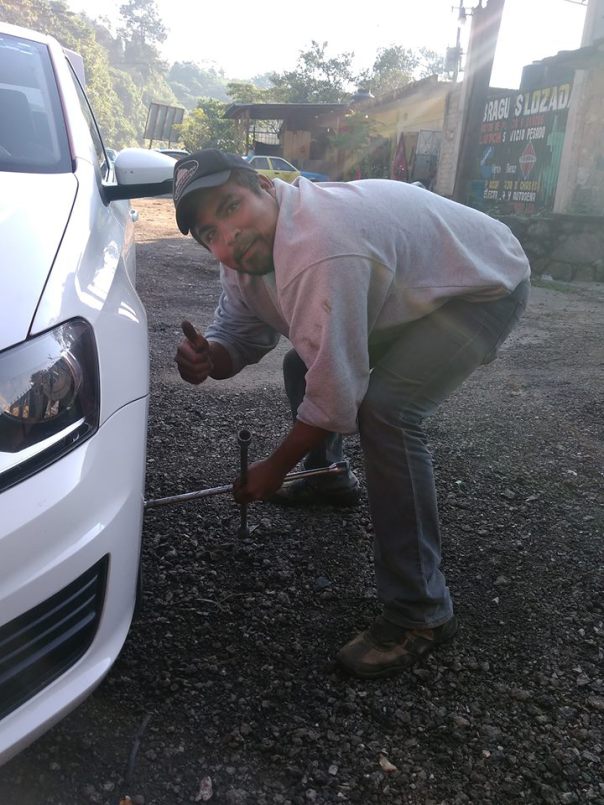 Amigo Mitch, fixing Steve’s tires.
Amigo Mitch, fixing Steve’s tires.
There are no accidents in this life, and in anything that appears like an accident, like my fateful entry into Mexico to experience a humanity and hospitality that is sorely absent these days in my own homeland, always grace is close at hand. I had wandered into one of those thin places and in that liminal space where the living meet the dead, I had encountered angels unaware.Blessings,
Steve
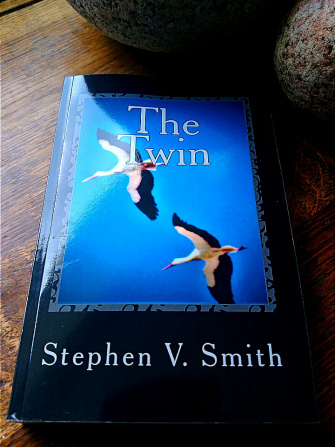 https://www.amazon.com/Twin-Untold-Story-Jesus-Thomas/dp/1542894018/ref=sr_1_1?s=books&ie=UTF8&qid=1509972047&sr=1-1&keywords=The+Twin+Stephen+SMith
Share this:
https://www.amazon.com/Twin-Untold-Story-Jesus-Thomas/dp/1542894018/ref=sr_1_1?s=books&ie=UTF8&qid=1509972047&sr=1-1&keywords=The+Twin+Stephen+SMith
Share this:- More

